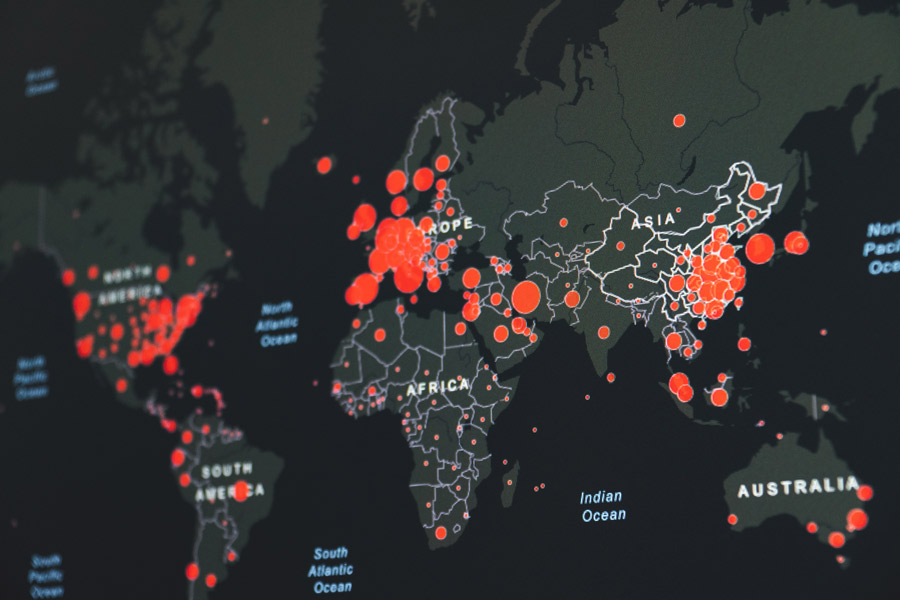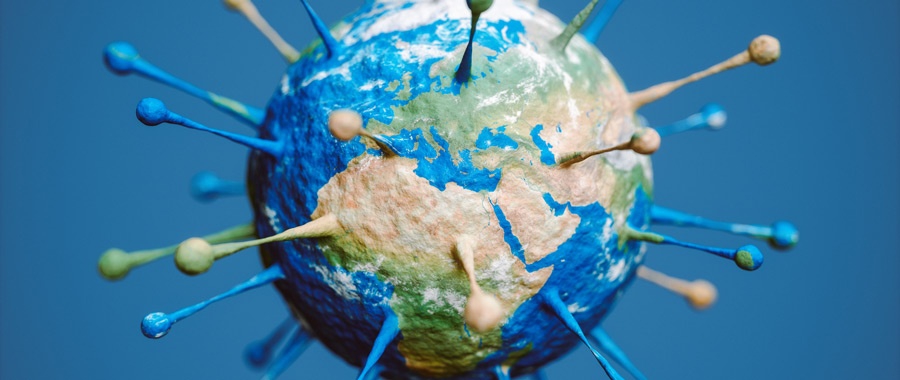The views expressed in our content reflect individual perspectives and do not represent the authoritative views of the Baha'i Faith.
It may seem weird to be thankful for a catastrophe, but the Covid-19 pandemic now sweeping the world, its ultimate outcome still uncertain, may be a blessing in disguise or a cloud with a silver lining.
Let me explain.
I’m not minimizing the suffering so many people have endured, or the grief that coronavirus deaths have engendered. Instead, I’m wondering whether this deadly virus has a larger lesson to teach us, if we’re willing to learn it.
“The Baha’i teachings long ago predicted this course of events, and warned humanity that it must unite to avert them”
People all around the world have been working for decades to identify and address social and environmental challenges and to make plans and set goals for a sustainable planet. I have personally been involved in these environmental plans for fifty years, since the first Earth Day in 1970, and have contributed to many constructive processes, leading most recently to the UN 2030 Agenda and its Sustainable Development Goals, as well as the Paris Agreement to address climate change.
However, alongside all this, governments have given priority to their national sovereignty, multinationals to their profits, and many world leaders to their inflated egos. Wealth is increasingly concentrated alongside growing inequality. Governments are failing to meet the needs of their people as they succumb to political fragmentation undermining democracy, when not already subverted to nativism, racism, corruption and despotism. A corporate stranglehold on the global economy, feeding off of a materialistic consumer culture, has escaped from regulation or control, and is plundering the planet’s resources while driving us to a climate catastrophe and the collapse of world biodiversity as we drown in pollution.
Nothing that we have done on the positive side has significantly slowed this headlong drive to destruction.
The Baha’i teachings long ago predicted this course of events, and warned humanity that it must unite to avert them:
“The winds of despair”, Baha’u’llah wrote, “are, alas, blowing from every direction, and the strife that divides and afflicts the human race is daily increasing. The signs of impending convulsions and chaos can now be discerned, inasmuch as the prevailing order appears to be lamentably defective.” This prophetic judgement has been amply confirmed by the common experience of humanity. Flaws in the prevailing order are conspicuous in the inability of sovereign states organized as United Nations to exorcize the spectre of war, the threatened collapse of the international economic order, the spread of anarchy and terrorism, and the intense suffering which these and other afflictions are causing to increasing millions. – The Universal House of Justice, The Promise of World Peace
So as a systems scientist, I have often asked myself what it would take to slam on the brakes and slow the momentum of this out-of-control material society – before it takes us so far beyond biological and planetary boundaries that it leads to the complete collapse of civilization.
In our rapidly globalizing world, our economic, social and environmental systems have become increasingly interconnected, and while this has greatly increased human productivity and interaction, it also raises our vulnerability to a complex systems failure, with one problem precipitating many others like falling dominos. In systems science, we call this a collapse – the sudden failure or disintegration of an entire system.

A collapse often requires a triggering event. A third world war is an obvious possibility, but not a desirable one, with most of the world’s population dying in atrocious circumstances. However, the Doomsday Clock has recently moved closer to apocalypse than ever before, as reckless leaders re-arm in their desire for global greatness or domination. If those leaders use nuclear arms, it could precipitate a nuclear winter and leave much of the planet uninhabitable for the survivors.
Accordingly, a financial collapse might be preferable to war. We barely escaped one as government, corporate and consumer debt grew into a giant bubble after the 2008 financial crisis. If currencies lost their value and global trade shut down, the reasoning goes, that might save us from a climate catastrophe and give us the incentive and the time to move to renewable energy sources.
A global pandemic was always another potential triggering event, something resembling the Spanish Flu of 1918 – but the emergence of such a threat, while probable at some point according to the World Health Organization (WHO), was unpredictable. Suddenly, though, it has happened.

The situation could be worse if the coronavirus behind Covid-19 had a higher fatality rate, although it could still kill millions before it runs it course. The knock-on effects may have an even more lethal impact, as populations are forced into isolation in an effort to slow the spread of the virus. Millions are losing their jobs and incomes. Education is interrupted. Whole sectors of the economy are frozen and driven towards bankruptcy. Supply chains are broken, including for essential medicines and equipment. Governments are doing what they can to protect their populations, shore up their overloaded health systems, and preserve their economies. With such obvious immediate priorities, worries about expanding debt are left for later.
While it is too early to predict where all of this pandemic’s effects will ultimately lead, it is clear that the world will never be the same.
The challenge now, as we struggle through the immediate crisis, is not to plan to go back to business as usual, as most governments seem to be doing. Instead, the Baha’i teachings ask us to see this global disease as an opportunity to fix what is wrong with our global society:
That materialistic ideals have, in the light of experience, failed to satisfy the needs of mankind calls for an honest acknowledgement that a fresh effort must now be made to find the solutions to the agonizing problems of the planet. The intolerable conditions pervading society bespeak a common failure of all, a circumstance which tends to incite rather than relieve the entrenchment on every side. Clearly, a common remedial effort is urgently required. It is primarily a matter of attitude. Will humanity continue in its waywardness, holding to outworn concepts and unworkable assumptions? Or will its leaders, regardless of ideology, step forth and, with a resolute will, consult together in a united search for appropriate solutions? – Ibid.
Covid-19 has begun to force people to rediscover the benefits of a strong local community, with solidarity for those more vulnerable. Our addiction to material things and the consumer lifestyle is being broken, as we learn that getting along with much less in a simpler material lifestyle is not necessarily a disaster. The forced shift to digital communication technologies has stimulated creative new ways to maintain social ties and economic activities. Behind all of this is the need to rethink our basic values and our ultimate purpose as human beings. This period of forced isolation is a unique opportunity to read, study, reflect, pray and meditate on what kind of future we want for ourselves, our families, our communities, our nations and the whole world. With modern communications, we can still hold meaningful conversations with others, and help them to see the positive side of what we are going through.
This terrible viral attack on humanity has also forced us to consider the necessity of global cooperation and a multilateral approach to governance. A virus respects no borders. No country can solve this problem by itself. The rationale for an effective system of global government has never been clearer. We take it as normal that a national government has legislative, executive and judicial functions which apply to everyone. Yet governments have failed to give the World Health Organization this overall capacity at the global level to organize a coherent approach to the crisis – which means that many lives will be lost as governments fumble to find the best way forward.
As we move beyond this crisis, reforming global governance should become a priority. If we want to be ready for the next pandemic, it is a necessity.
We also will be forced to reimagine how the world economy should work. We were on the verge of a major debt crisis before the pandemic began. We already know that the enormous financial effort necessary to respond to immediate needs today will leave an unmanageable level of debt tomorrow. Many businesses of all sizes will be bankrupt. A financial system based on endless borrowing was never sustainable in the long term, and its collapse now seems inevitable. What will we put in its place? Should we move to a worldwide currency? Should businesses be chartered to serve society rather than just their shareholders? How do we create meaningful employment for everyone? What mechanisms for the more equitable distribution of wealth would meet everyone’s basic needs and eliminate poverty?
Perhaps you can see why I feel positive about the opportunities that this pandemic could ultimately open up. If we respond well, it might represent the chance we need to make the paradigm shift called for in the UN 2030 Agenda, and to accelerate our transition to a just, sustainable, climate-friendly civilization in harmony with nature.
Beyond the immediate crisis I see hope.
You May Also Like
Comments

















CORONA VIRUS LETTER TO HUMANITY
The earth whispered but you did not hear.
The earth spoke but you did not listen
The earth screamed but you turned her off.
And so I was born...
I was not born to punish you..
I was born to awaken you..
The earth cried out for help...
Massive flooding. But you didn't listen.
Burning fires. But you didn't listen.
Strong hurricanes. But you didn't listen.
Terrifying Tornadoes. But you didn't listen.
...
You still don't listen to the earth when
Ocean animals are dying due to pollutants in the waters.
Glaciers melting at an alarming rate.
Severe drought.
Non-stop wars.
Non-stop greed.
You just kept going on with your life..
No matter how much hate there was..
No matter how many killings daily..
It was more important to get that latest iPhone than worry about what the earth was trying to tell you..
But now I am here.
And I've made the world stop on its tracks.
I've made YOU finally listen.
I've made you take refuge.
I've made you stop thinking about materialistic things..
th...
You are only worried ...about YOUR survival.
How does that feel?
Non-stop wars.
Non-stop greed.
You just kept going on with your life..
No matter how much hate there was..
No matter how many killings daily..
It was more important to get that latest iPhone than worry about what the earth was trying to tell you..
But now I am here.
And I've made the world stop on its tracks.
I've made YOU finally listen.
I've made you take refuge.
I've made you stop thinking about materialistic things..
th...
You are only worried ...about YOUR survival.
How does that feel?